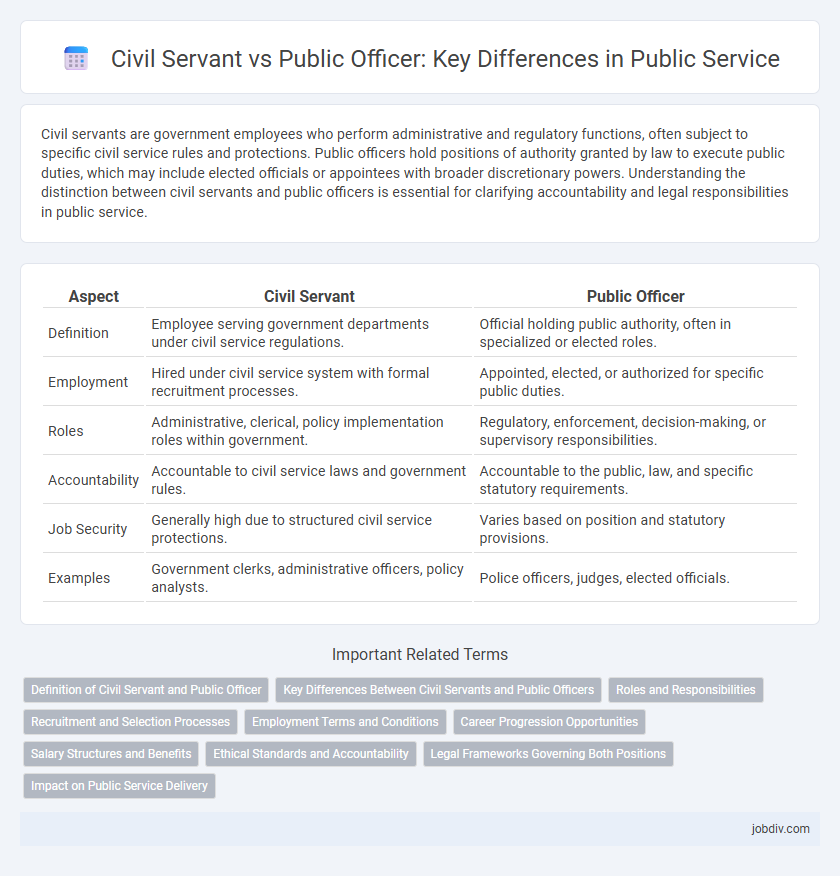Civil servants are government employees who perform administrative and regulatory functions, often subject to specific civil service rules and protections. Public officers hold positions of authority granted by law to execute public duties, which may include elected officials or appointees with broader discretionary powers. Understanding the distinction between civil servants and public officers is essential for clarifying accountability and legal responsibilities in public service.
Table of Comparison
| Aspect | Civil Servant | Public Officer |
|---|---|---|
| Definition | Employee serving government departments under civil service regulations. | Official holding public authority, often in specialized or elected roles. |
| Employment | Hired under civil service system with formal recruitment processes. | Appointed, elected, or authorized for specific public duties. |
| Roles | Administrative, clerical, policy implementation roles within government. | Regulatory, enforcement, decision-making, or supervisory responsibilities. |
| Accountability | Accountable to civil service laws and government rules. | Accountable to the public, law, and specific statutory requirements. |
| Job Security | Generally high due to structured civil service protections. | Varies based on position and statutory provisions. |
| Examples | Government clerks, administrative officers, policy analysts. | Police officers, judges, elected officials. |
Definition of Civil Servant and Public Officer
A civil servant is an individual employed by the government to implement public policies and deliver essential services within various administrative departments. A public officer is a person vested with official duties and responsibilities by law, often including authority to make decisions or enforce laws on behalf of a government entity. While all civil servants are public officers, not all public officers are classified as civil servants, reflecting distinctions in legal status and scope of authority.
Key Differences Between Civil Servants and Public Officers
Civil servants are government employees who work in various administrative roles within ministries or departments, while public officers hold specific positions of authority with statutory responsibilities. Civil servants typically follow standardized recruitment and promotion procedures based on merit, whereas public officers may be appointed through political or legal processes. The primary distinction lies in public officers' decision-making powers and accountability under public law, contrasting with civil servants' operational and supportive functions.
Roles and Responsibilities
Civil servants are government employees responsible for implementing public policies, managing public resources, and delivering services to citizens across various departments and agencies. Public officers hold positions of authority mandated by law or statute, often involving regulatory, administrative, or decision-making duties that impact public governance and compliance. The roles of civil servants emphasize operational execution and administrative support, while public officers focus on enforcement, oversight, and maintaining ethical standards within public institutions.
Recruitment and Selection Processes
Civil servant recruitment typically involves rigorous competitive examinations and standardized assessments to ensure merit-based selection, whereas public officer appointments often emphasize qualifications aligned with specific statutory or administrative requirements. Selection processes for civil servants prioritize transparency, fairness, and equal opportunity, utilizing formalized testing and evaluation panels. Public officer recruitment may include direct appointments based on expertise or political considerations, reflecting varying governance structures and operational needs.
Employment Terms and Conditions
Civil servants typically have permanent employment with structured career progression and benefits governed by civil service regulations, ensuring job security and standardized pay scales. Public officers often serve under fixed-term contracts or appointments with conditions outlined in specific statutes or public service agreements, which may offer less job stability but greater flexibility. Employment terms for civil servants emphasize merit-based advancement and pension schemes, while public officers' conditions can vary widely depending on their role and governing authority.
Career Progression Opportunities
Civil servants typically experience structured career progression through well-defined promotion pathways based on merit, seniority, and examinations within government departments. Public officers may have more varied opportunities for advancement depending on the specific public sector agency or jurisdiction, with some roles offering limited hierarchical mobility. Career progression in both roles often depends on performance evaluations, professional development, and the availability of higher positions within the public administration system.
Salary Structures and Benefits
Civil servants typically receive standardized salary structures based on government pay scales, which include incremental increases tied to years of service and rank advancement. Public officers often have more varied compensation packages, sometimes supplemented by performance bonuses, allowances, and benefits tailored to specific departments or agencies. Both roles usually offer comprehensive benefits such as pension schemes, health insurance, and paid leave, but the exact scale and additional perks can differ significantly across jurisdictions.
Ethical Standards and Accountability
Civil servants adhere to strict ethical standards that emphasize impartiality, integrity, and confidentiality to maintain public trust, while public officers are held accountable through specific legal frameworks that govern their conduct and decision-making processes. Both roles require transparency and responsibility, but civil servants often follow codes of conduct established within their agencies, whereas public officers face direct oversight from regulatory bodies and public institutions. Effective accountability mechanisms, including audits, disciplinary actions, and public reporting, ensure ethical compliance and safeguard the public interest in both positions.
Legal Frameworks Governing Both Positions
Civil servants and public officers operate under distinct legal frameworks that define their roles, responsibilities, and appointment processes within government structures. Civil servants are typically governed by comprehensive civil service laws, regulations, and codes that standardize employment conditions, performance, and discipline across various departments. Public officers, while often subject to general administrative laws, may also be appointed or regulated under specific statutes or executive orders tailored to their unique public functions and accountability mechanisms.
Impact on Public Service Delivery
Civil servants are typically career employees within government agencies, ensuring consistent and efficient public service delivery through institutional knowledge and long-term commitment. Public officers often hold appointed or elected positions with specific authority, driving policy decisions that shape service priorities and responsiveness. The collaboration between civil servants' operational expertise and public officers' strategic leadership significantly enhances the effectiveness and accountability of public service delivery.
Civil Servant vs Public Officer Infographic

 jobdiv.com
jobdiv.com